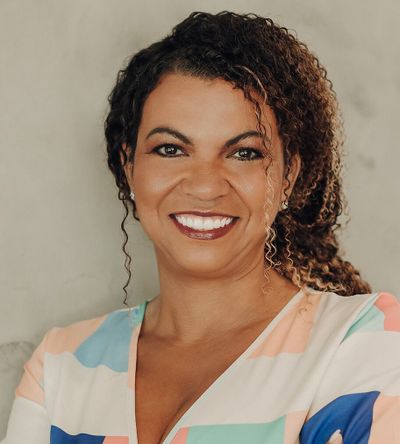When Anna Franklin speaks about health equity, she doesn’t just cite statistics – she tells stories of lived experience, ancestral resilience, and the healing that comes from reclaiming cultural practices. As the founder of Maji Rising, Franklin is building a movement that blends healthcare access with cultural care, weaving joy, trust, and justice into every layer of community wellness.
“I have been in healthcare for over 33 years,” Franklin says. “And in the last five to six years, I have really had a role within the healthcare organization that I work for that’s focused in on health equity. One theme that I consistently see is that the Black community – our community – has some of the poorest outcomes in hypertension control, depression screening with follow up, cancer screening, diabetes control. And no matter what interventions we would make, it just wasn’t shifting the tide enough.”
That frustration, and a nudge from her husband, sparked a radical step: create something new. He challenged her to make her own.
“And that’s what we did. We developed Maji Rising – not in criticism of the larger organizations, but to supplement and act as more of a liaison between our community and the larger healthcare organizations.”
Water as Life, Culture as Care
Maji, meaning water in Swahili, became the symbol for the nonprofit.
“Maji means water in Swahili, and water is life. Water has healed us, but it’s also destroyed us. When you think about our journey coming from Africa to the United States, water both sustained us and devastated us. We chose the name Maji Rising because we wanted it to symbolize the renewal, the flow, and most importantly, the collective power of our community coming together so that we are able to rise above the barriers that we have historically experienced, that we are currently experiencing, and that we will continue to experience. But how do we rise above those barriers? That’s what Maji Rising is about.”
For Franklin, the essence of Maji Rising is not giving people power but reminding them of what already lives inside them.
“We always talk about how we’re empowering individuals. But that’s wrong – because we’re assuming that they didn’t have power in the first place. And we do. Every single one of us has power. The question is: how do we activate it?”
Healing in Familiar Spaces
This October, Maji Rising will host its first major event – a two-day health block party designed to look less like a clinic and more like a family reunion. Dental exams, cancer screenings, behavioral health services, massages, and primary care screenings will be offered alongside music, food vendors, STEM activities, a Black tooth fairy, and a teddy bear clinic for kids.
“We called it a block party because that’s in our culture. Our block parties are not just a gathering of people, it’s a safe space. We’re gonna go to the block and we’re gonna get this, we’re gonna get that, I got this problem … it was more like – it’s a safe space, it’s a celebration, it’s where we know we belong.”
Franklin emphasizes that Maji Rising will not reproduce the rigid, intimidating dynamics of modern, Western health care.
“We’re not doing this where we’re sitting behind a table. We are in front of our table and we are interacting. We’re dancing and we’re eating. We’re breaking down fear and white coats with joy and cultural authenticity.”
Stories, Trust and the Long Game
The unique approach to exploring health care at the pop-up block party is intentionally designed to create a sense of familiarity and comfort – normalizing conversations about our general wellness so that unspoken fears don’t keep us quiet or “buttoned up.”
“We have to listen to each other,” she says. “Not to make someone else’s diagnosis yours, but to learn from our collective experiences. That’s how we build confidence to walk in and advocate for ourselves.”
Beyond the Block Party
While the October event is the launch, Franklin and her board have a bigger plan. In partnership with Take Up the Cause (featured in the November 2024 Black Lens), Maji Rising is developing Beloved Kijiji (“beloved village” in Swahili) – a housing and healthcare community inspired by Dr. Martin Luther King Jr.’s vision of the beloved community.
“Our goal is to create a community that provides 72 units of wraparound housing with healthcare centered in the middle of it. If you have food inequities, housing inequities, transportation inequities, childcare needs – we’re building a community to address those drivers of health. Safe housing is fundamental to health.”
Franklin believes this project will embody the same principles as the block party: justice, access, and cultural authenticity. Franklin describes her work as being firmly grounded in justice, access, and cultural authenticity. For her, it’s essential that leadership and decision-making come from within the very communities where people live, breathe, pray, work, and play.
Community as Kin
Franklin ties her vision back to the deep traditions of Black family reunions, gatherings that emerged after emancipation when families tried to reconnect after being separated by slavery.
“Community is kin. It always has been. The family reunion is not just about blood, because it couldn’t be – our families were fractured and sold apart. It’s about reconnection. And that’s what this is, too.”
Her vision is clear: joy as medicine, cultural care as healthcare, and power as something already within us, waiting to be activated.
Learn more about Maji Rising online at www.majirising.org.
